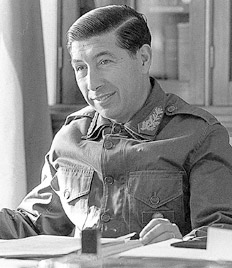Mario Benjamín Menéndez facts for kids
Quick facts for kids
Mario Benjamin Menéndez
|
|
|---|---|

General Menendez during Operation Independence
|
|
| Military Governor of the Malvinas Islands, South Georgia and the South Sandwich Islands | |
| In office 3 April 1982 – 14 June 1982 |
|
| President | Leopoldo Galtieri |
| Preceded by | Sir Rex Hunt |
| Succeeded by | Jeremy Moore |
| Personal details | |
| Born | 3 April 1930 Buenos Aires, Argentina |
| Died | 18 September 2015 (aged 85) |
| Spouse | Susana Arguello (m. 1955) |
| Children | 3 (2 daughters, 1 son) |
| Alma mater | Colegio Militar de la Nación |
| Military service | |
| Branch/service | Argentine Army |
| Rank | Brigadier general |
| Battles/wars | Falklands War |
Mario Benjamin Menéndez (born April 3, 1930 – died September 18, 2015) was an important Argentine general. He became the military governor of the Falkland Islands in 1982. This happened when Argentina took control of the islands. He was also a high-ranking officer in the Argentine Army. General Menéndez later surrendered the Argentine forces to British troops during the Falklands War.
Contents
Early Life and Military Career
Mario Benjamin Menéndez started his military journey as a cadet. He attended the national military college. Over time, he rose through the ranks of the Argentine military.
In the mid-1970s, he was a full colonel. He served in the 5th Infantry Brigade. During this time, he took part in a military operation. This operation was called Operativo Independencia. It aimed to stop a rebel group in Tucuman province.
Later, he commanded the 6th Mountain Brigade. This unit was located in Neuquén province. By March 1982, Menéndez had become a general. He was in charge of the First Corps in Buenos Aires. He was also part of a special military committee. This committee advised the Argentine president each week. They discussed topics like foreign relations and military spending.
Role in the Falklands War
On April 2, 1982, Argentine forces landed on the Falkland Islands. These islands were a British territory. Argentina quickly took control of them. The next day, British Prime Minister Margaret Thatcher announced a plan. She said British forces would be sent to take the islands back.
General Menéndez arrived in Stanley, the capital, on April 7. His job was to become the new governor of the islands. He was known as a skilled soldier. Menéndez had to work with leaders from the Argentine navy and air force. He officially took charge of the Malvinas Joint Command on April 26. The Argentine government approved this decision.
Two other Argentine generals were also in the Falklands. They were higher in rank than Menéndez. They sometimes treated his orders as suggestions. Menéndez chose a strategy of fighting from fixed positions. He wanted to defend against any British landings. This was instead of moving his troops around a lot. Some people later criticized this plan. However, one historian said it suited his soldiers' abilities well.
Key Battles and Challenges
British troops landed on the islands in May. They won several battles against the Argentine defenders. One important battle was the Battle of Goose Green on May 29. After this defeat, Menéndez and his team felt very discouraged. This feeling spread to many Argentine officers.
In late May, Menéndez tried a bold move. He gathered his army and special forces. His plan was to set up a screen to attack British supply lines. He also hoped to capture British soldiers. However, his forces were ambushed by British special forces. A Puma helicopter was shot down during this attack. Ten Argentine commandos were killed. Twenty-three were injured or captured.
In early June, British forces prepared to attack hills near Stanley. Menéndez was pressured to attack Fitzroy. This settlement had recently been taken by the British. But Menéndez decided to stay on the defensive. After the British captured the hills, he thought about pulling his troops back from Stanley. He considered holding the main airfield instead.
The Surrender
On June 14, Menéndez spoke with Lieutenant-General Leopoldo Galtieri. Galtieri was the President of Argentina. They talked by radio about the situation. Galtieri told Menéndez to counter-attack with all his soldiers. He reminded Menéndez that military rules said a commander should fight until many soldiers are lost.
However, Menéndez's morale was very low. He began talking with a Spanish-speaking British officer by radio. Menéndez agreed to meet with British representatives that afternoon. In the evening, General Menéndez surrendered his forces.
Later Life and Passing
After the surrender, Menéndez was removed from his leadership roles. In October 1983, he was arrested by the Argentine Army. He was held for 60 days. His mother said this was related to a book he had published. The book described his experiences during the war.
In October 2012, he was arrested again. This was along with 16 other people. The arrest was part of an investigation into his actions during Operativo Independencia in 1975. Menéndez had been second-in-command of the 5th Infantry Brigade. This unit fought against rebel groups in Tucumán province. They also detained people who helped the rebels.
Mario Benjamin Menéndez passed away in Buenos Aires on September 18, 2015. He had been in the hospital for two weeks. In 2019, it was reported that his ashes were secretly scattered on the Falkland Islands. This happened in December 2015. The Falkland Islands government had not given permission for this.
See also
 In Spanish: Mario Benjamín Menéndez para niños
In Spanish: Mario Benjamín Menéndez para niños

